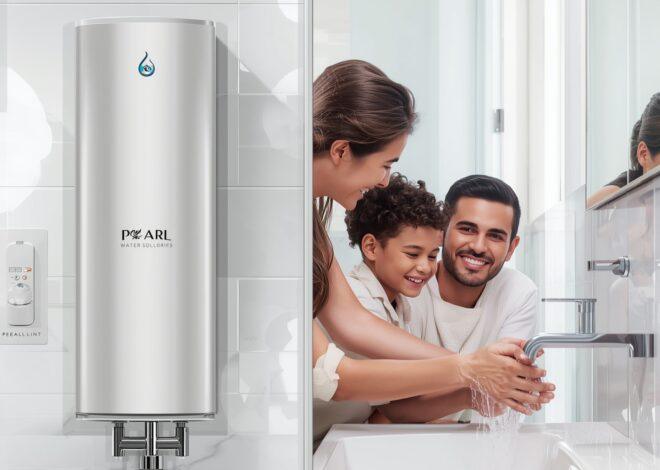How Does a Water Softener Work? Simple Explanation for Beginners
Discover how a water softener works, its benefits, types, and uses. Protect your home, appliances, skin, and hair with soft water solutions.
Table of Contents
Introduction to Water Softener
What is a Water Softener?
How Does a Water Softener Work?
Benefits of a Water Softener
Types of Water Softeners
Signs You Need a Water Softener
How to Choose the Right Water Softener
Role of Salt in Water Softener
Environmental Impact of Water Softener
Installation and Maintenance
FAQs About Water Softener
Conclusion
🛠️ Introduction to Water Softener
Hard water is a problem in many homes. It contains calcium and magnesium minerals. These cause stains, scale, and plumbing damage.
A water softener solves this by converting hard water into soft water. It protects skin, hair, appliances, and pipelines.
💡 Hook: Spotless bathrooms and long-lasting appliances are possible with a water softener.
💧 What is a Water Softener?
A water softener is a filtration system that removes hardness-causing minerals through ion exchange.
Hard water creates problems like:
White stains on taps and tiles
Soap and detergent wastage
Dry skin and rough hair
Scale buildup inside geysers and pipes
A water softener prevents these issues completely.
⚙️ How Does a Water Softener Work?
Step 1 - Hard Water Entry
Hard water enters the tank with calcium and magnesium ions.
Step 2 - Ion Exchange Process
Resin beads hold sodium ions
Calcium and magnesium get trapped by resin
Sodium replaces them in the water
Step 3 - Soft Water Supply
Soft water flows out to your taps, showers, and appliances.
Step 4 - Regeneration Cycle
Resin becomes full of hardness minerals
Saltwater brine flushes the tank
Resin beads get recharged with sodium
Process repeats automatically
🏠 Benefits of a Water Softener
Household Benefits
Prevents white marks on utensils and tiles
Extends life of washing machines and geysers
Reduces soap and shampoo consumption
Keeps clothes soft and bright
Skin feels smooth, hair stays shiny
Commercial Benefits
Prevents boiler and cooling tower scaling
Lowers energy and repair bills
Protects industrial machines from limescale
💡 Hook: A small investment in a water softener saves huge repair costs later.
🔎 Types of Water Softeners
Salt-Based Water Softener: Most effective and removes hardness completely
Salt-Free Water Softener: Prevents scaling, suitable for mild hard water
Dual Tank Water Softener: Provides continuous soft water for large families
Portable Water Softener: Compact and mobile, perfect for travel and small homes
💡 Signs You Need a Water Softener
White stains on taps and utensils
Soap does not lather well
Skin feels dry after bathing
Appliances need frequent repair
Scale buildup in plumbing pipes
📊 How to Choose the Right Water Softener
Test water hardness before buying
Choose tank size based on family needs
Compare water softener price options
Look for warranty and service support
Prefer trusted brands for reliability
💡 Hook: The right water softener gives peace of mind and years of savings.
🧂 Role of Salt in Water Softener
Salt is essential for regeneration. It recharges resin beads and restores efficiency. Without salt, the system cannot function properly.
Use high-quality salt tablets for smooth performance.
🌍 Environmental Impact of a Water Softener
Reduces soap and detergent usage
Extends life of appliances, reducing waste
Saves water and energy by preventing scale buildup
Eco-friendly models reduce salt and water use
🧑🔧 Installation and Maintenance
Install near main water supply line
Ensure proper drainage for brine discharge
Refill salt regularly
Clean brine tank once every few months
Schedule professional service annually
FAQs About Water Softener
Q1. What is a water softener?
A device that removes hardness minerals and provides soft water.
Q2. Is a water softener safe for drinking water?
Yes. It removes hardness but keeps essential minerals safe.
Q3. How often should I add salt?
Usually once every month, depending on water usage.
Q4. Can I install a water softener myself?
Yes, but professional installation ensures best performance.
Q5. What is the life of a water softener?
With care, it lasts 10–15 years.
Q6. Does soft water taste salty?
No, it tastes fresh and natural.
Q7. What is the cost of a water softener in India?
Prices range from ₹15,000 to ₹60,000 depending on capacity.
Q8. Do I need a water softener for borewell water?
Yes, borewell water often has high hardness levels.
Q9. What is regeneration in a water softener?
A process that restores resin beads using saltwater brine.
Q10. Can a water softener save money?
Yes, by reducing energy bills, detergent costs, and appliance repairs.
Conclusion
A water softener is essential for homes and businesses facing hard water issues.
It improves water quality, protects appliances, and saves money.
With soft water, you enjoy smoother skin, shiny hair, and efficient appliances.
👉 Choose a reliable brand like Pearl Water Technologies for long-lasting water treatment solutions.
📌 Suggested URL: https://pearlwater.in/water-softeners
